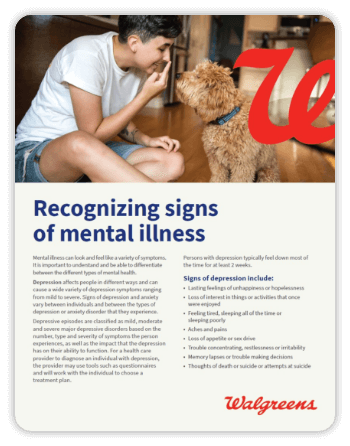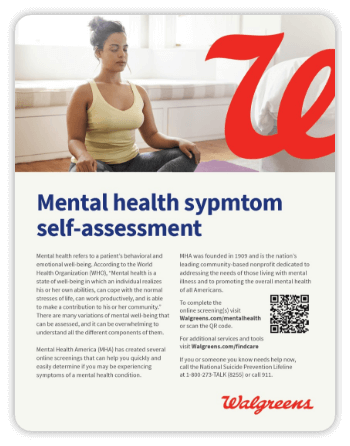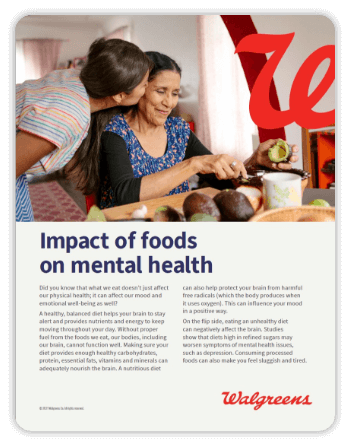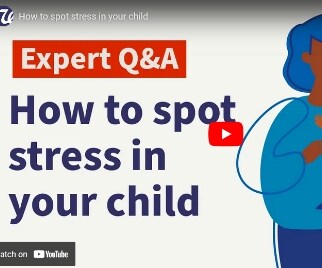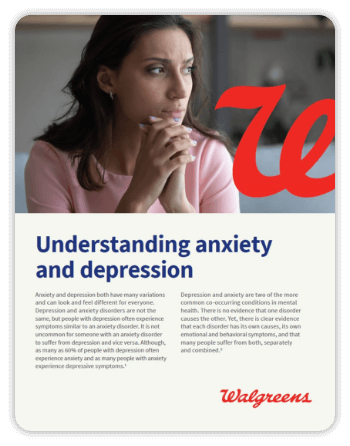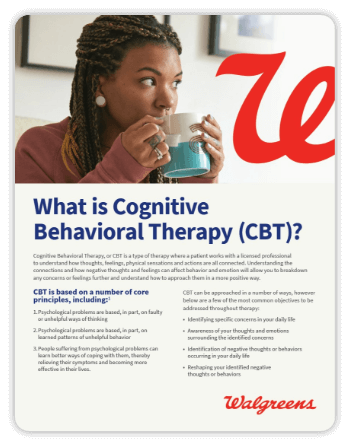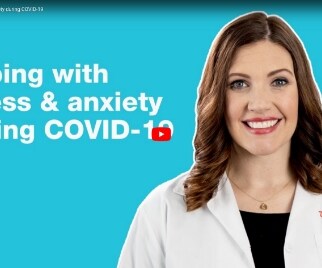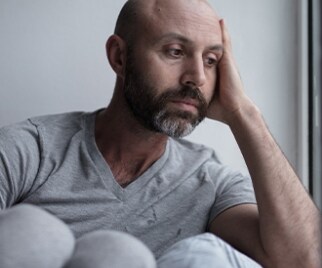Mental Health Tools & Resources | Walgreens
Here to support your mental health
As a part of Walgreens commitment to help the people in the U.S. who are struggling with mental health conditions, we plan to make Mental Health First Aid (MHFA) training available to all of our pharmacists.
This training gives our pharmacists the tools to assist someone experiencing a mental health crisis until appropriate professional help can step in. This training is the result of a collaboration between Walgreens, the National Council for Behavioral Health and the American Pharmacists Association (APhA).

If you think you may have a mental illness, talk to your primary care provider or a mental health specialist. If you are having thoughts of harming yourself or others get help right away. Call 911 or contact the 988 Suicide & Crisis Lifeline 24/7 by calling or texting
988 or via online chat at 988lifeline.org

Mental health & illness
What you want to know and how you can find support.
- What is mental health?
According to the World Health Organization (WHO), mental health is a state of well-being in which you realize your own abilities, can cope with the normal stresses of life, can learn and work productively, and are able to contribute to your community.
- What are tips for healthy routines?
Having a good, healthy routine is linked to improved mental and physical health. There are many things you can do to create a healthy routine, but some easy ideas include: plan your day and stick to a schedule, add physical activity to your routine and eat healthy foods and take care of your body.
- What is mental illness?
Mental illness is a health condition that involves changes in emotion, thinking, or behavior (or a combination of these).
- How do I know if I have a mental illness?
To understand if you may have a mental illness, look for signs of changes in your thoughts, feelings, and behaviors that may be having a negative impact on school, work, relationships, etc. See some examples of these signs below:
- You used to be very cheerful and outgoing, but do not feel so lately
- You are unable to perform simple daily task
- Things you used to enjoy have lost their appeal
- Youʼre always tired and consistently falling asleep
- You have difficulty concentrating
- Youʼre experiencing delusions, paranoia and/or hallucinations
- Youʼre always irritated, aggressive or violent
- You are having thoughts of harming yourself or others
- You are drinking, smoking and using drugs more than normal
If you think you may have a mental illness, talk to your primary care provider or a mental health specialist. If you are having thoughts of harming yourself or others get help right away. Call 911 or the National Suicide Prevention Lifeline at 1-800-273-TALK (1-800-273-8255).
- How is a mental illness diagnosed?
A diagnosis can be determined by performing various tests including: a physical exam, lab tests, and psychological evaluations. Then, using the Diagnostic and Statistical Manual of Mental Disorders (DSM), a healthcare provider or mental health professional will be able to identify the cause of your symptoms and make a diagnosis.
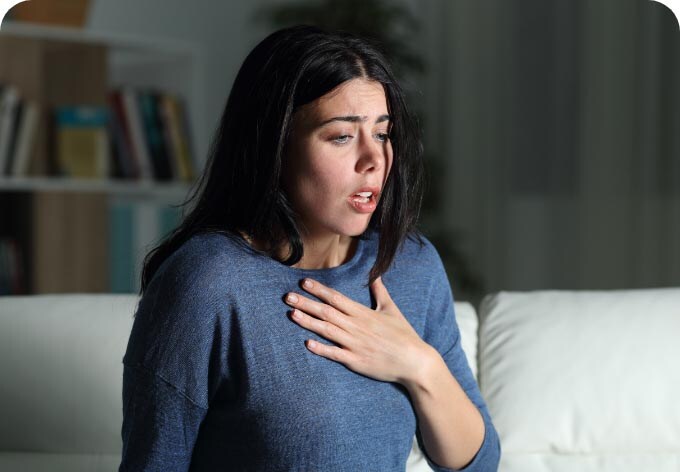
Anxiety disorder
- What is anxiety disorder?
Anxiety disorder is characterized by lengthy preparation for a real or perceived threat. The symptoms can interfere with daily activities such as job performance, schoolwork, and relationships.
- What are some of the common types of anxiety disorders?
Common types of anxiety include:
- Generalized anxiety disorder (GAD): People with GAD experience excessive anxiety or worry about everyday life, for prolonged periods of time ranging from months to even years. Worries can include anything, and even the most common worries can cause significant problems in their lives.
- Panic disorder: People with panic disorder have recurrent, sometimes unexpected periods of intense fear, discomfort or sense of loss of control that come on quickly in the absence of clear danger or triggers.
- Social anxiety disorder: Social anxiety disorder is an extreme, persistent fear of being judged or watched by others. For some, this fear may be so significant that it makes it difficult for them to go to work, attend school, or do everyday things.
- Phobia-related disorders: Phobias are fears of specific objects (like needles) or situations (like flying) that are out of proportion to the actual danger caused by the situation or object.
- How might a panic attack present?
During a panic attack, people may experience: a pounding heartbeat, chest pain, sweating, shaking, shortness of breath, the feeling of having no control or the feeling that something bad is going to happen soon.
- What are the symptoms of social anxiety disorder?
Social anxiety disorder symptoms may include:
- Blushing, perspiring, or shaking
- Heart racing or pounding
- Stomach aches or pains
- Stiff body stance or using an overly so voice when speaking
- Trouble making eye contact or being in the presence of people you arenʼt familiar with
- Feelings of self-consciousness or fear others will judge you in a negative way.
- What are signs & symptoms of phobia-related disorders?
People with a phobia may:
- Excessively or irrationally worry about encountering the feared object or situation
- Take active steps to avoid whatever it is they fear
- Experience immediate intense anxiety when in the presence of the feared object or situation
- Experience intense anxiety when they cannot avoid the objects or situations
- How is anxiety disorder diagnosed?
If you think you may have an anxiety disorder, talk to your healthcare provider. You may also need to see a mental health specialist. A psychiatrist, psychologist and certain other mental health professionals can diagnose anxiety and provide counseling and/or medications.
To do so, they will likely perform a physical exam to rule out any physical illnesses. Then, using the Diagnostic and Statistical Manual of Mental Disorders (DSM), a mental health professional will be able to identify the cause of your symptoms and make a diagnosis.
If you think you may have a mental illness, talk to your primary care provider or a mental health specialist. If you are having thoughts of harming yourself or others get help right away. Call 911 or the National Suicide Prevention Lifeline at 1-800-273-TALK (1-800-273-8255).
- What is the treatment for anxiety disorder?
Health care providers can treat anxiety disorder and/or refer individuals to mental health professionals, such as psychologists or psychiatrists. Anxiety disorder treatment typically involves medication, psychotherapy, or both, depending upon the severity of the anxiety.
Psychotherapy is also known as talk therapy. A therapist or counselor may include cognitive behavioral therapy (CBT) in your treatment plan as this is the most effective form of psychotherapy for anxiety disorders. CBT teaches specific skills to improve your symptoms and help you better manage situations and symptoms that cause you distress.
Medications do not cure anxiety disorder but can be very helpful for managing the associated symptoms. If prescribed medication, itʼs important to note that some medications may take several weeks to begin having an effect, and up to a couple months to reach full effect. Itʼs also common to have to try different medications or doses to find out what works best for you. The most common types of medications used to treat anxiety disorders, include antidepressants, anti-anxiety medications, and beta-blockers.
Work with a health care provider to find the best treatment for you.
What are the symptoms of generalized anxiety disorder (GAD)?
Learn how to treat anxiety disorder
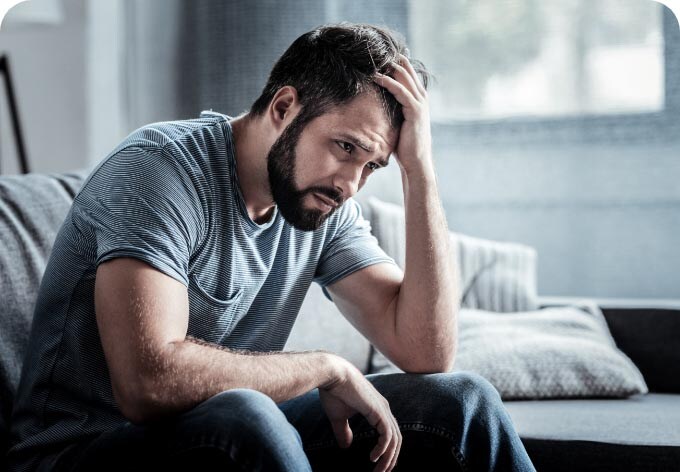
Depression
- What is depression?
Depression, also called clinical depression or major depressive disorder, is a common, serious mood disorder that affects how you feel, think, and are able to function in your day-to-day life.
- Are there physical symptoms associated with depression?People with chronic depression may also experience persistent physical symptoms, such as headaches, stomach problems or pain that do not respond to treatment or are not related to other conditions. Keep in mind that some medical conditions such as thyroid disorders may trigger some of the same symptoms associated with depression. However, your healthcare provider can rule out other health conditions by doing a complete physical exam and ordering lab work.
- How is depression diagnosed?
To be diagnosed with depression, an individual must have five depression symptoms daily almost all day for at least two consecutive weeks. One of these symptoms must be a depressed mood or a loss of interest or pleasure in nearly all activities. Children and adolescents may be irritable instead of sad.
If you think you may have depression, talk to your health care provider. Primary care providers can diagnose and treat depression or refer individuals to mental health professionals, such as psychologist or psychiatrist. Your healthcare provider or mental health specialist may ask you when your symptoms started, how long they last, how oen they occur, and if they keep you from going out or doing your typical activities.
- What is the treatment for depression?
Health care providers can treat depression and/or refer individuals to mental health professionals, such as psychologists or psychiatrists. Depression treatment typically involves medication, psychotherapy, or both, depending upon the severity of the depression.
If prescribed medication, itʼs important to note that any of the medications may take up to four weeks to begin having an effect, and up to 12 weeks to reach full effect. Itʼs also common to have to try various medications or doses of medications to find out what works for you.
Work with a health care provider to find the best treatment for you.
What are the signs and symptoms of depression?
Find ways to manage depression
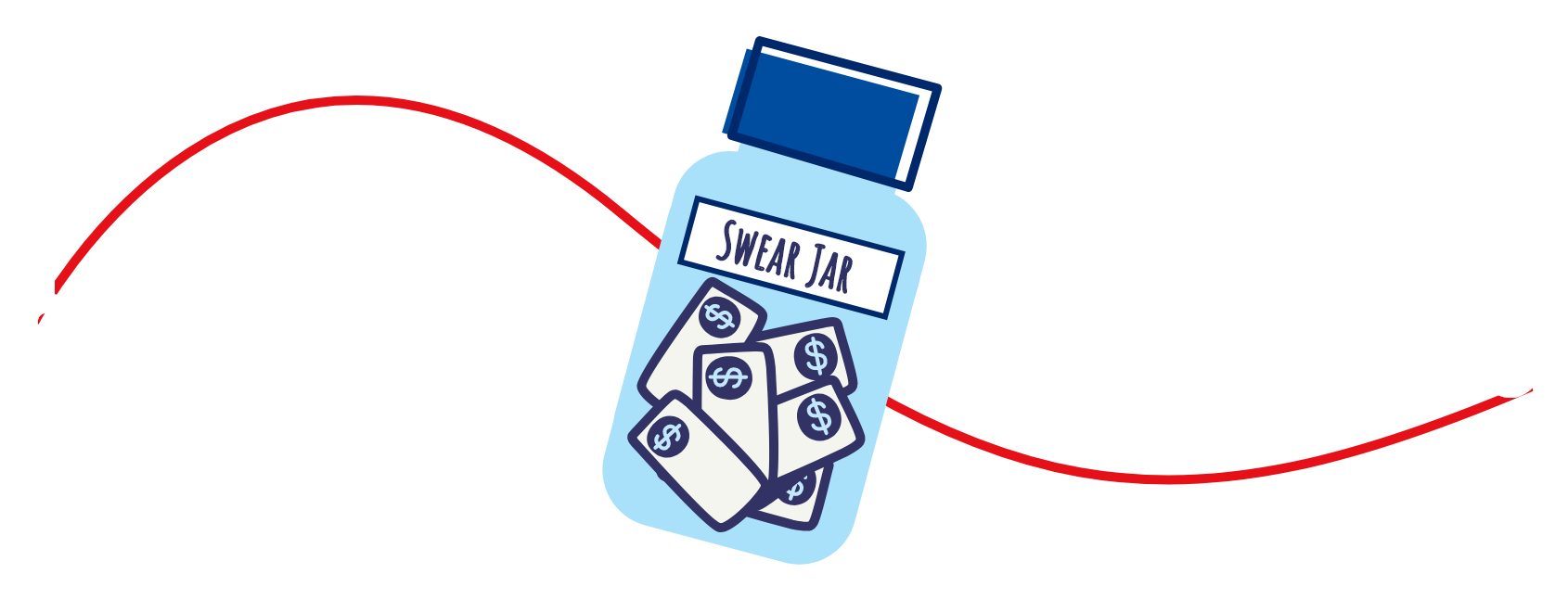
Walgreens and Mental Health America teamed up in 2021 to provide mental health support. Together, we created The Swear Jar, a charitable donation program that raised $1.3MM. Those funds went to providing support and resources to those facing mental health challenges.

The Trevor Project is the world's largest suicide prevention and mental health organization for lesbian, gay, bisexual, transgender, queer and questioning (LGBTQ) young people. In the U.S. alone, Trevor estimates there are more than 1.8M LGBTQ youth who seriously consider suicide every year - with an increased risk of suicide and mental health challenges among LGBTQ youth of color as well as transgender and non-binary youth.
With support from partners like Walgreens, The Trevor Project has provided free, confidential, and life-saving counselling services to over 200,000 LGBTQ young people in the past year.




